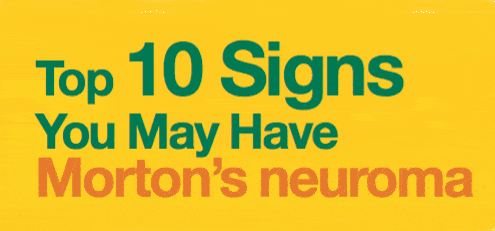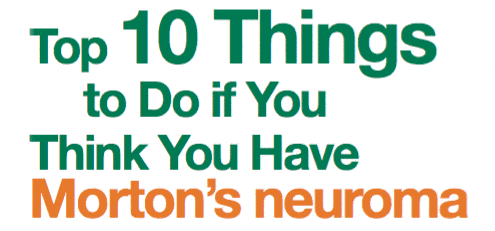Are there times when you feel like there’s a rock stuck inside your shoes or a fold in your sock when there isn’t? These are the sensations you’ll feel when you have Morton’s neuroma, which involves the thickening of the nerve tissues leading to your toes. To help people with this condition, doctors often use a Morton’s neuroma treatment that involves surgery.
Here at The Center for Morton’s Neuroma, we understand that surgery has a high failure rate (frequently over 30%) so we specialize in non-surgical Morton’s neuroma treatment. You don’t have to worry if you’re one of those people who don’t want to pursue a surgical Morton’s neuroma treatment. Frequently those who have surgery end up with more pain than they started with. If you’re looking for a long term Morton’s neuroma treatment that doesn’t involve surgery, call us right away!
Morton’s neuroma is a common condition that affects the ball of a person’s foot. Many people start experiencing Morton’s Neuroma by feeling a pain in this area of the foot that feels similar to stepping on a pebble or your bunched up sock.
This condition can cause a great deal of discomfort, and in many cases, pain that can affect walking, running, balance, and mobility. Morton’s neuroma is typically caused by the thickening of a tissue near the nerve leading to your toes. Certain types of shoes or athletic, high-impact activities are seen as common causes for developing Morton’s neuroma. By avoiding these areas, some people can find relief from Morton’s neuroma. However, sometimes this is not enough, and more intervention is required.
Surgery should not always be the first answer. Surgery is always an intensive procedure, that is not guaranteed effective. It is much easier and safer to look into non-surgical treatments for Morton’s Neuroma. At The Center For Morton’s Neuroma, we specialize in non-surgical treatments for this foot condition. We offer a wide variety of cutting edge treatments that can help patients feel better, all while avoiding any type of surgery. Get in touch with our team today to learn more. Continue reading to find out about some of our treatment types.
If you want a non-surgical Morton’s neuroma treatment, you can seek recommendations from your doctor. Medical practitioners don’t always have to use surgery as Morton’s neuroma treatment. They can pursue different approaches to treat this condition without the involvement of an operation that has high failure rates. Here are some choices that you have if you opt for a non-surgical Morton’s neuroma treatment:
Ablation therapy (ultrasound guided) is a type of Morton’s neuroma treatment that destroys tissue abnormalities with the use of a thin probe inserted through the skin. This type of Morton’s neuroma treatment can involve the use of radiofrequency (heat), cryotherapy (cold nitrous oxide), or chemicals,(concentrated alcohol.) All our procedures are done under ultrasound guidance and under local anesthesia so they are pain free. There are three ways to do this treatment:
This type of Morton’s neuroma treatment destroys the diseased tissue by using intense freezing temperatures through nitrous oxide.
This type of Morton’s neuroma treatment destroys the diseased tissue by using intense freezing temperatures through nitrous oxide.
This is the Morton’s neuroma treatment where a mixture of a local anesthetic and sclerosing agents is directly injected to the infected tissue. The procedure can significantly reduce the painful sensations you feel.
This procedure uses high-frequency radio waves to heat the tissue to a temperature of 90 degrees Celsius. This breaks down the nerve’s protein fibers that causes you pain. Furthermore, this type of Morton’s neuroma treatment can speed up your healing process by the creation of new blood vessels.
The simplest form of a Morton’s neuroma treatment is the use of medications. Since this condition is caused by damaged tissues, your doctor can recommend medications to temporarily help relieve the pain. There are three substances that used when medicine is used as a Morton’s neuroma treatment.
First are NSAIDs, which are non-steroidal anti-inflammatory drugs. The second is Tylenol, which is considered as an analgesic and antipyretic. The third are tricyclic antidepressants, which can control the pain intensity you feel. In extreme cases, the drugs that will be administered in the Morton’s neuroma treatment are temporary pain medications.
Physical therapy is a conservative type of Morton’s neuroma treatment. The therapist may recommend the use of an orthotic foot device called the metatarsal pad. Other forms of physical therapy used under this Morton’s neuroma treatment include stretching exercises and deep tissue massage. Both of these may temporarily decrease pain and inflammation caused by the damaged tissues.
Don’t wait for your condition to get worse, contact The Center For Morton’s Neuroma today. We are committed to providing our patients with non-surgical treatments for their Morton’s Neuroma. Our philosophy is to only recommend surgical interventions as a very very last resort.
To know more about our products and services you can call us at (774) 421-9144 or email us at office@mortonsneuroma.com. You can also visit our clinic at 600 Worcester Rd, Suite 301, Framingham, MA 01702.
We specialize in the treatment of Morton’s neuroma. Our team is committed to listening to our patients and evaluating Morton’s neuroma symptoms in order to move forward with treatment. We offer a number of noninvasive procedures to treat Morton’s neuroma symptoms.
At The Center For Morton’s Neuroma, we will work with you to develop a treatment plan that takes into account your unique medical history. In addition, our team can utilize a combination of non surgical procedures and advanced techniques.
If left untreated, Morton’s neuroma can limit your mobility and prevent you from doing the things you enjoy. You can rely on us to be your partner in helping restore your quality of life as much as possible. Get in touch with us today if you or a loved one is experiencing Morton’s neuroma symptoms.
At The Center for Morton’s Neuroma, we understand how this condition affects the quality of your life. That’s why we specialize in this condition to provide you with the medical attention you need. Our doctors are dedicated to giving the Morton’s neuroma treatment that can work best for you.
If you need help with the pain and discomfort that you feel, reach out to us. We understand what you’re going through and we’re here to help. Our doctors will do their best to meet your needs.


By providing us with your information you are consenting to the collection and use of your information in accordance with our Terms of Service and Privacy Policy.